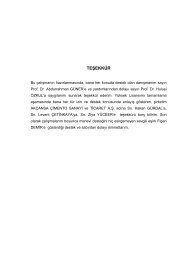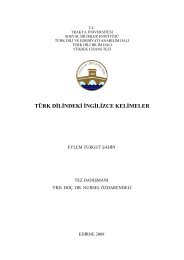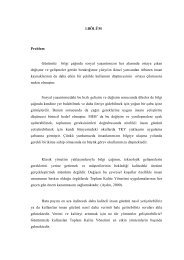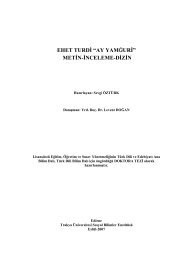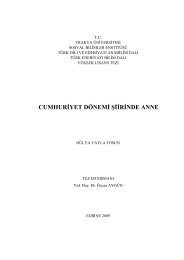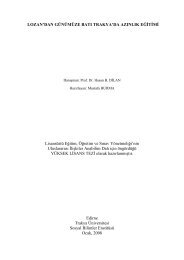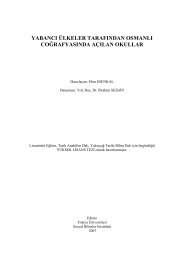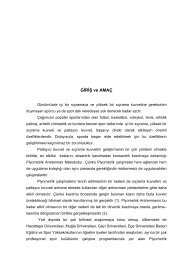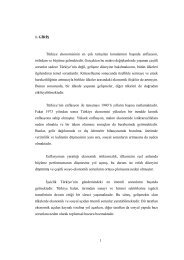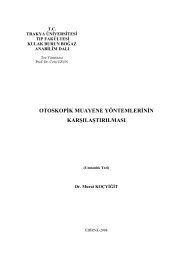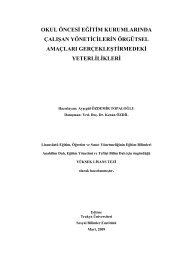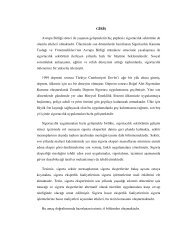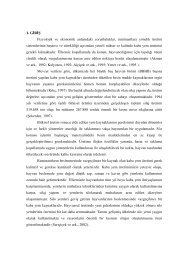kırklareli devlet hastanesi'nde çalışan sağlık personelinin ve ...
kırklareli devlet hastanesi'nde çalışan sağlık personelinin ve ...
kırklareli devlet hastanesi'nde çalışan sağlık personelinin ve ...
You also want an ePaper? Increase the reach of your titles
YUMPU automatically turns print PDFs into web optimized ePapers that Google loves.
in<strong>ve</strong>stigator through personal interviews. Different types of gynecologic cancers were<br />
estimated on a basis of 50, whereas total gynecologic cancer knowledge point was evaluated<br />
on a basis of 250 points. Chi-square, Anova, Kruskal-Wallis and Mann Whitney U test and<br />
Pearson correlation analysis were employed for statistical analysis.<br />
It was determined that 57.1% of admitted patients had knowledge about gynecologic<br />
cancer and 18% of them had periodical gynecologic examination. These rates were in order of<br />
92.7% and 12.5% among healthcare staff. While 40.1% of admitted patients and 52.1% of<br />
healthcare staff had at least one pap smear test before, 15.2% of admitted patients and 51.1%<br />
of healthcare staff reported “knowledge about vulvar self-examination”. People who had both<br />
these screening methods performed displayed higher knowledge le<strong>ve</strong>ls. The rate of<br />
participants who mentioned “adequate” le<strong>ve</strong>l of knowledge about gynecologic cancers was<br />
only 3.4%.<br />
Age, contracepti<strong>ve</strong> method and frequency of gynecological examination were found to<br />
ha<strong>ve</strong> no influence o<strong>ve</strong>r the knowledge le<strong>ve</strong>ls on gynecological cancer among the entire study<br />
group, whereas the departments of the healthcare staff had affected le<strong>ve</strong>ls of gynecological<br />
cancer knowledge. Among the admitted patients knowledge le<strong>ve</strong>ls were found to be higher as<br />
their le<strong>ve</strong>ls of income increased, but higher numbers of previous pregnancies and abortions<br />
displayed a correlation with lower knowledge points. Married participants, uni<strong>ve</strong>rsity<br />
graduates, civil servants, people with history of cancer in the family and members of<br />
Retirement Fund were found to ha<strong>ve</strong> higher knowledge le<strong>ve</strong>ls.<br />
In gynecological cancer subgroups, the knowledge points showed a rise as the age<br />
increased, but dropped with the increases in the number of children, pregnancies, births and<br />
abortions. The ages for first marriage and sexual intercourse were found to affect the<br />
knowledge points for cervical, ovarian and endometrial cancers. Cervical and ovarian cancer<br />
knowledge le<strong>ve</strong>ls were found to be higher in patients who had performed pap smear test<br />
before.<br />
Key Words: Gynecologic cancer, knowledge, healthcare staff, pap smear, Human<br />
Papilloma Vırus.<br />
57



